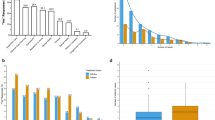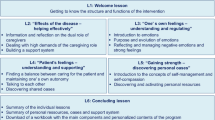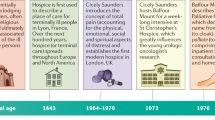Abstract
The treatment of cancer requires that health care providers and caregivers from many disciplines work together on the intertwined physical, psychological, social and spiritual needs of oncology patients. Providing a conceptual framework explaining how the members of multidisciplinary oncology treatment teams may best interact with each other and the patient helps drive patient-centered care and clarifies the roles of specific team members at various times over the course of treatment. The ABC model of multidisciplinary care in cancer treatment describes the roles of the active caregivers (for example, physicians or nurses), basic supportive caregivers (for example, psychologists or chaplains) and community support (for example, advocacy groups or hospital staff) providing the full continuum of the cancer treatment experience. Teams trained in the ABC model should better understand the function and importance of each member's role, increase patient involvement and satisfaction with treatment, and ultimately improve patient outcomes.
This is a preview of subscription content, access via your institution
Access options
Subscribe to this journal
Receive 12 print issues and online access
$209.00 per year
only $17.42 per issue
Buy this article
- Purchase on Springer Link
- Instant access to full article PDF
Prices may be subject to local taxes which are calculated during checkout

Similar content being viewed by others
References
Burke, T. W. The origins of multidisciplinary cancer care. Gynecol. Oncol. 110 (3 Suppl. 2), S2–S3 (2008).
Jain, R. K. Lessons from multidisciplinary translational trials on anti-angiogenic therapy of cancer. Nat. Rev. Cancer 8, 309–316 (2008).
Blazeby, J. M. et al. Analysis of clinical decision-making in multi-disciplinary cancer teams. Ann. Oncol. 17, 457–460 (2006).
Proctor, M. L., Pastore, J., Gerstle, J. T. & Langer J. C. Incidence of medical error and adverse outcomes on a pediatric general surgery service. J. Pediatr. Surg. 38, 1361–1365 (2003).
Petrie, H. G. Do you see what I see? The epistemology of interdisciplinary inquiry. Educ. Researcher 5, 9–15 (1976).
Hall, P. & Weaver, L. Interdisciplinary education and teamwork: a long and winding road. Med. Educ. 3 5, 867–875 (2001).
Madge, S. & Khair, K. Multidisciplinary teams in the United Kingdom: problems and solutions. J. Pediatr. Nurs. 15, 131–134 (2000).
Jenkins, V. A. Fallowfield, L. J. & Poole, K. Are members of multidisciplinary teams in breast cancer aware of each other's informational roles? Qual. Health Care 10, 70–75 (2001).
Mariano, C. The case for interdisciplinary collaboration. Nurs. Outlook 37, 285–288 (1989).
Hall, K. L. et al. The collaboration readiness of transdisciplinary research teams and centers findings from the National Cancer Institute's TREC year-one evaluation study. Am. J. Prev. Med. 35 (2 Suppl.), S161–S172 (2008).
Acknowledgements
The ABC conceptual model was developed on the basis of experience with Japanese colleagues through the Japan TeamOncology Program, a partnership between MD Anderson Cancer Center and Japanese institutions (St Luke International Hospital and Keio University) to establish and promote multidisciplinary clinical oncology programs through outstanding clinical research and educational programs. The authors acknowledge all MD Anderson faculty members who have participated in the Japan TeamOncology Program (http://www.teamoncology.com; Terri Armstrong, Donald Berry, Jeffrey Bryan, Francisco Esteva, Phyllis Evetts, Barry Feig, Gabriel Hortobagyi, Kellie Jones, Jack Lee, Zhongxing Liao, Paul Mansfield, Joyce Neumann, Dina Patel, Hillary Prescott, Aysegul Sahin, Hetal Shah, Nicholas Szewczyk, Richard Theriault, Shen Yu and Ralph Zinner) and have provided input on how the ABC conceptual model should be defined. The authors thank Stephanie Deming (Department of Scientific Publications, The University of Texas MD Anderson Cancer Center) for editorial assistance.
Author information
Authors and Affiliations
Contributions
J. Apted, T. D. Ito and N. T. Ueno researched the data for the article. J. Apted, M. Black, T. D. Ito and N. T. Ueno substantially contributed to the discussion of the content. J. Apted, M. Black, R. K. Grigsby and N. T. Ueno contributed to the writing of the first draft of the article and all authors were involved in the review and editing of the manuscript prior to submission.
Corresponding author
Ethics declarations
Competing interests
The authors declare no competing financial interests.
Rights and permissions
About this article
Cite this article
Ueno, N., Ito, T., Grigsby, R. et al. ABC conceptual model of effective multidisciplinary cancer care. Nat Rev Clin Oncol 7, 544–547 (2010). https://doi.org/10.1038/nrclinonc.2010.115
Published:
Issue Date:
DOI: https://doi.org/10.1038/nrclinonc.2010.115
This article is cited by
-
Current nursing practice for patients on oral chemotherapy: a multicenter survey in Japan
BMC Research Notes (2014)
-
Psychologists’ views of inter-disciplinary psychosocial communication within the cancer care team
Supportive Care in Cancer (2014)
-
Preconditions for successful guideline implementation: perceptions of oncology nurses
BMC Nursing (2011)



